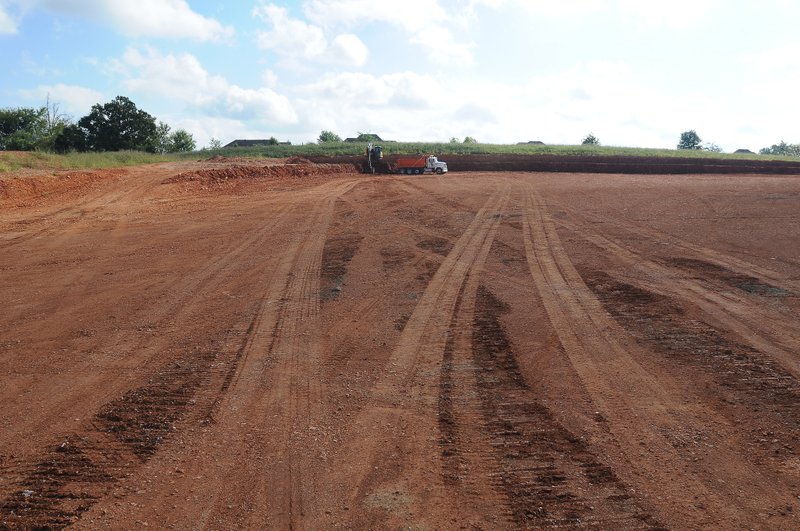FAYETTEVILLE -- A proposed, county-run dirt pit moved one step closer to opening near Winslow after Road Department officials presented a report showing savings for running their own dirt pit.
The report included information from a test showing the dirt is OK for road fill.
Proposed dirt pit
The Washington County Road Department has proposed building its own red dirt pit at 18264 S. U.S. 71 in Winslow on about 15 acres. The landowners are relatives of a county employee, so the project requires Quorum Court approval. The proposal allowing the county to do business with the landowners was tabled in March but had its first reading Thursday. It will return during the next Quorum Court in May.
Source: Staff report
"We're moving forward," said Charles Ward, Road Department superintendent. "I'm hopeful."
The Quorum Court approved the first reading of a proposal to use property at 18264 S. U.S. 71 for a county-run dirt pit Thursday during its meeting.
A push for a second reading failed, so the ordinance will move to the next Quorum Court meeting.
Road Department crews built a road to where they planned to mine dirt before finding out Quorum Court approval was required. The road, which was four-tenths of a mile long, cost the county about $14,000, according to a report released to Quorum Court members Thursday.
The Road Department officials asked justices of the peace in March to allow the county to do business with Allen and Paul Reed. The Reeds are related to Bridge Superintendent Travis Reed.
The issue was tabled in March. Some justices of the peace said they worried there was a perception of nepotism.
Ward said Thursday building the road before approval was a mistake. Ward and Assistant Superintendent Brad Phillips thought the county had done everything they should before starting the work, they said.
No other sources of dirt are available in the area, other than the Reeds' property, according to the proposal presented Thursday.
Justice of the Peace Tom Lundstrum, a Republican representing northwestern Washington County, said he wasn't sure the only red dirt available was on land owned by an employee's family. The perception still isn't good, he said.
"I still have a problem with doing business with family members of Washington County employers," Lundstrum said. "People look at this type of thing and they aren't happy about it. The only red dirt we can find belongs to the family of one of our supervisors?"
Road Department employees went door-to-door in the area asking landowners about buying red dirt in January, according to the report. No one was interested, Ward said.
The key is the mine will save money and fix roads, said Justice of the Peace Ann Harbison, a Democrat representing southern Washington County.
The mine is in Harbison's district.
The county plans to pay $3.50 per load to Paul Reed compared to $12 for a similarly load from a commercial dirt mine, Ward said. Another mine the county uses charges $4 per load.
The county plans to use roughly 1,000 loads per year to maintain roads in the area, Ward said. The dirt will solely be used for maintaining roads and not on major thoroughfares, according to the Road Department report.
The pit could last 10-15 years, Phillips said.
Justice of the Peace Robert Dennis, a Republican representing west-central Washington County that includes Farmington, said he could see the savings. Having the county-run pit is "common sense," he said.
"I see absolutely no evil here," Dennis said.
The Road Department also tested the soil where the mine will be to make sure the dirt could be used as road fill, Ward said.
A testing service determined the dirt at the proposed site is "adequate to use for road fill," according to Ark-Con Testing Service in a report dated April 21.
"The truth is this is good dirt," Harbison said.
The area is known to be "unfavorable for road construction," said Edgar Mersiovsky, Arkansas soil scientist with the U.S. Department of Agriculture's Natural Resources Conservation Service, in email. Long term, the kind of dirt prevalent in the Winslow area creates uneven roads with potholes, he said.
Dirt that shrinks and swells isn't the best for road construction but can be used for construction, said Stacy Williams, director of the Center for Training Transportation Professionals at the University of Arkansas. But, long term, roads will last longer with better construction material, she said.
The question is whether getting better quality red dirt is affordable and better for the county, Williams said.
Williams and Mersiovsky weren't at Thursday's meeting.
NW News on 04/22/2016
Correction: A previous version of this story incorrectly indicated that Williams made a statement specifically concerning the properties of dirt in the Winslow area. The incorrect information has been removed.

